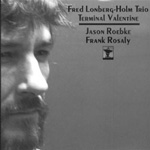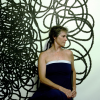Home » Jazz Articles » Extended Analysis » Fred Lonberg-Holm Trio: Fred Lonberg-Holm Trio: Terminal Valentine
Fred Lonberg-Holm Trio: Fred Lonberg-Holm Trio: Terminal Valentine
 Fred Lonberg-Holm
Fred Lonberg-Holm Terminal Valentine
Atavistic
2007
Recalibrating the idea of a piano-less jazz trio by excluding a wind instrument and including a cello takes a certain amount of chutzpah. But in 2000, cellist Fred Lonberg-Holm convened such a trio to record music honoring the cellist Fred Katz, who introduced the cello to a jazz context when drummer Chico Hamilton featured him in his quintet during the 1950s.
Riding out personnel changes in the group, Lonberg-Holm finally found stability with Jason Roebke as the bassist and Frank Rosaly as the drummer. Terminal Valentine, the trio's third release as the Valentine Trio—and billed as its last, at least under that name—was recorded in 2006 in Chicago. Lonberg-Holm composed all ten songs on the record; the trio improvised on the tunes to arrive at the final product.
Because the cello is the lead instrument, the music is to a large extent moulded by the parameters of the cello's tonality. Lonberg-Holm attacks the strings of his instrument without hesitation from the outset, no matter with the bow or pizzicato, and his confident approach challenges the expectations that some listeners might bring to the line-up. Instead of considering the cello as simply communicating weight because of its size, the listener is instead encouraged to accept the idea that the cello ranks between the violin and the bass, and possesses an elasticity well suited to improvised music.
The affable, generous and straightforward character of the trio's music allows any improvisatory abstractions that occur to be heard as metaphorical bumps, and sometimes hills, in the aural road. The cello sings the brightest of melodies and tells the liveliest of stories. Continually changing bowing techniques create variations and give light to Lonberg-Holm's compositions, producing a compelling soundscape.
Lonberg-Holm can methodically negotiate through dissonance, sprinkling bent pitches amidst glissandi that lend a sparkling personality to the music. He can weave transitions between crackling, scraping, off-center staccato passages and flowing melody, as he notably does on "No One Will Ever Be Forgotten." When his bow and fingers literally become caught up in the strings ("There's No Way , "Maybe It's Too Late ), how he wiggles his way out is charming and innocent, rather than mired in "seriosity." "One For The Road is a stunning example of Lonberg-Holm's capacity to translate situation to music. This tune ends the disc well; there is no where else to go.
The bass and the drums offset the cello sonically as well as rhythmically. It is refreshing to hear a two-part rhythm section enrich the voice of the lead instrument as well as establish itself independently, even if only in the development of a bridge ("There Never Was A Reason," "There's No Way ).
The bass' reverberant strings operate in stark contrast to the tautness of the cello strings. Generally, the rhythmic nature of the music brings out Roebke's innate rhythmic sense. His versatility in the pizzicato complements the bowing of the cello and enhances the buoyancy of the cello's tone. Roebke's intimate alliance with Lonberg-Holm's complex fast-bowing helps to broaden its intensity ("Just Don't Listen ).
Rosaly's drumming follows through on every cello sound with varying stick to cymbal combinations which enrich the color of the musical surface in ways that strings cannot, even when Lonberg-Holm stretches their percussiveness. In "Maybe It's Too Late, the drumming puts itself in the forefront to emphasize the cello's mournful phrasings, and in "Just Don't Listen some lengthy snare/brush rolling is integrated with a huge bass drum pulse and tiny cymbal tickling, in parallel with the cello's improv. And in "There Never Was A Reason, Rosaly exposes in a brief solo the reverberant characteristics of his drumming, suggesting one reason Lonberg-Holm invited him to join the trio.
"There Never Was A Reason is the most poignant piece on Terminal Valentine. Destiny might have supplied the only reason for this trio to come together for three recordings. And destiny will be the reason that the group continues to play, albeit under another name.
Tracks: Three Note Song; Maybe It's Too Late; And You Smile; No One Will Ever Be Forgotten; Just Don't Listen (To The Birds); There Never Was A Reason; Shift Of The Eye; There's No Way; I Know You; One For The Road.
Personnel: Fred Lonberg-Holm: cello; Jason Roebke: bass; Frank Rosaly: drums.
Track Listing
Three Note Song; Maybe Its Too Late; And You Smile; No One Will Ever Be Forgotten;Just Don't Listen (To The Birds); There Never Was A Reason; Shift Of The Eye; There's No Way; I Know You; One For The Road.
Personnel
Fred Lonberg-Holm: cello; Jason Roebke: bass; Frank Rosaly: drums.
Album information
Title: Fred Lonberg-Holm Trio: Terminal Valentine | Year Released: 2007 | Record Label: Atavistic Worldwide
< Previous
"Live" Volume 1
Next >
String Theory
Comments
Tags
For the Love of Jazz
 All About Jazz has been a pillar of jazz since 1995, championing it as an art form and, more importantly, supporting the musicians who create it. Our enduring commitment has made "AAJ" one of the most culturally important websites of its kind, read by hundreds of thousands of fans, musicians and industry figures every month.
All About Jazz has been a pillar of jazz since 1995, championing it as an art form and, more importantly, supporting the musicians who create it. Our enduring commitment has made "AAJ" one of the most culturally important websites of its kind, read by hundreds of thousands of fans, musicians and industry figures every month.


















